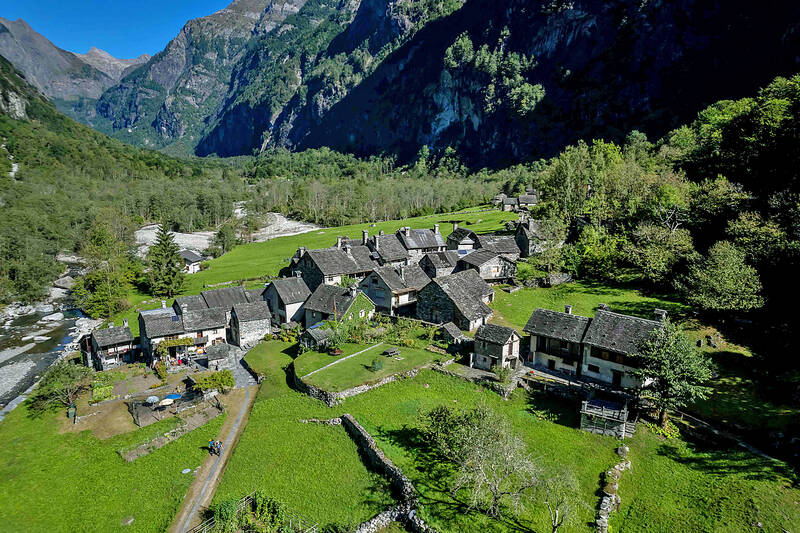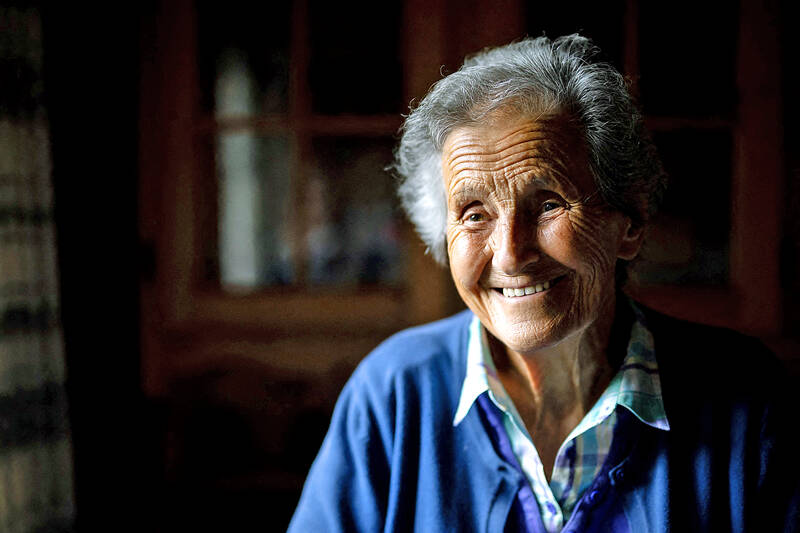While people across Europe are being urged to save energy this coming winter to avert power shortages, Switzerland’s Bavona Valley is unfazed, having never been plugged into the power network.
Located in the Italian-speaking Ticino region of southern Switzerland, the remote, glacially carved valley following the Bavona river is one of the steepest in the Alps.
There are 12 hamlets made up of stone dwellings scattered along the rugged valley that are home to a few dozen inhabitants for most of the year, except in winter, when fewer than 10 stay on.

Photo: AFP
Eleven of the hamlets are not connected to the power grid, despite the area producing lots of electricity thanks to dams high up near the mountain tops.
They were built after World War II to provide electricity for the German-speaking region of Switzerland over on the northern side of the Alps, said Romano Dado, a former local councilor in Cevio, the village at the lower end of the valley on which the hamlets depend.
Bringing power down into the valley would have required transformers, but “the people here didn’t have the money for that,” he said.

Photo: AFP
Only the last hamlet at the very top of the valley could afford this luxury.
As the decades passed, the valley’s population shrank from about 500 to fewer than 50, Dado said, adding that the inhabitants learned to get by without being on the electricity grid, making do with their fireplaces and installing solar panels on the roofs as early as the 1980s.
Residents also use gas canisters, candles and oil lamps.
To wash their clothes, “we go to the river, as always,” said Tiziano Dado, Romano Dado’s stonemason brother.
The narrow valley, about 10km long and flanked by towering slopes reaching more than 2,500m above sea level, has seen fatal avalanches, floods and landslides throughout the centuries.
Seasonal migration to the summer pastures persisted in the area until the 1970s. Families went up the valley with their animals from March until the end of December, coming back down for Christmas, said Sonia Fornera, a researcher at Orizzonti Alpini, a group of experts in Alpine history and culture.
“It was a hard life, but a simple life,” Bice Tonini, 88, said, as she warmed herself by the fireplace in her house.
Despite her age, she continues to live there from spring to October thanks to her solar panels.
“There is so much wastage of electricity” in modern society, she said.
At night, there are no street lights to prevent her from admiring the stars — and she enjoys the nightly show far more than watching television, which is a rare sight in the valley.
“We are used to living in a very simple way and we’re not afraid of making savings” in terms of energy, said Ivo Dado, 81, who proudly had solar panels installed on his house in the valley in 1987.
The former farmer, who is not immediately related to the Dado brothers, is delighted that some cities are giving up on their traditional festive illuminations in December.
“This Christmas will be as before, with less light. It will be beautiful again,” he said.
This sparing attitude toward electricity is not to everyone’s taste.
“Solar panels are a partial solution,” said Martino Giovanettina, a writer and owner of one of the few restaurants in the valley.
He believes the lack of electricity, as well as the stringent rules for renovating old buildings, are contributing to depopulating the valley, turning it into an open-air “museum” of the past, instead of orientating toward tourism, as neighboring valleys have done.
The Bavona Valley has no set up for tourists at all, apart from a cable car from the last hamlet up to the dams, and the parking of motorhomes is banned.
Doris Femminis, a 2020 Swiss Prize for Literature winner, grew up in the valley and raised goats there during her 20s. Now she recounts the story of the Bavona Valley in her books.
Now living in the Jura mountains in western Switzerland, she returns every two months to this “wonderful place of one’s childhood,” she said.
“In Switzerland, we like the idea of still having a corner of wild nature,” she said, but acknowledged that such places are not suited to modern life.
“It’s a place of the past,” she said. “Nobody wants to live there anymore; it’s just a dream.”

A Chinese scientist was arrested while arriving in the US at Detroit airport, the second case in days involving the alleged smuggling of biological material, authorities said on Monday. The scientist is accused of shipping biological material months ago to staff at a laboratory at the University of Michigan. The FBI, in a court filing, described it as material related to certain worms and requires a government permit. “The guidelines for importing biological materials into the US for research purposes are stringent, but clear, and actions like this undermine the legitimate work of other visiting scholars,” said John Nowak, who leads field

Brazil, the world’s largest Roman Catholic country, saw its Catholic population decline further in 2022, while evangelical Christians and those with no religion continued to rise, census data released on Friday by the Brazilian Institute of Geography and Statistics (IBGE) showed. The census indicated that Brazil had 100.2 million Roman Catholics in 2022, accounting for 56.7 percent of the population, down from 65.1 percent or 105.4 million recorded in the 2010 census. Meanwhile, the share of evangelical Christians rose to 26.9 percent last year, up from 21.6 percent in 2010, adding 12 million followers to reach 47.4 million — the highest figure

Swedish campaigner Greta Thunberg was deported from Israel yesterday, the Israeli Ministry of Foreign Affairs said, the day after the Israeli navy prevented her and a group of fellow pro-Palestinian activists from sailing to Gaza. Thunberg, 22, was put on a flight to France, the ministry said, adding that she would travel on to Sweden from there. Three other people who had been aboard the charity vessel also agreed to immediate repatriation. Eight other crew members are contesting their deportation order, Israeli rights group Adalah, which advised them, said in a statement. They are being held at a detention center ahead of a

‘THE RED LINE’: Colombian President Gustavo Petro promised a thorough probe into the attack on the senator, who had announced his presidential bid in March Colombian Senator Miguel Uribe Turbay, a possible candidate in the country’s presidential election next year, was shot and wounded at a campaign rally in Bogota on Saturday, authorities said. His conservative Democratic Center party released a statement calling it “an unacceptable act of violence.” The attack took place in a park in the Fontibon neighborhood when armed assailants shot him from behind, said the right-wing Democratic Center, which was the party of former Colombian president Alvaro Uribe. The men are not related. Images circulating on social media showed Uribe Turbay, 39, covered in blood being held by several people. The Santa Fe Foundation